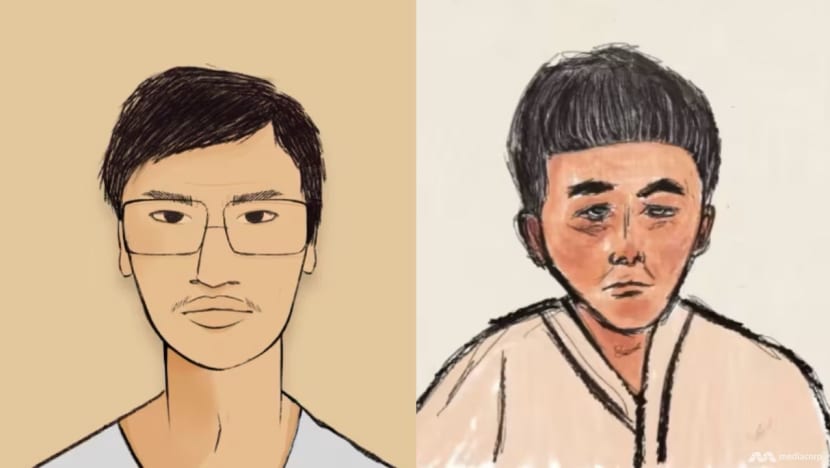CNA Explains: How were the sentences decided for duo convicted in billion-dollar money laundering case?
The amount of criminal proceeds laundered is just one factor, says a lawyer.

Su Wenqiang and Su Haijin are the first two to be convicted in Singapore's largest money laundering case. (Illustrations: TODAY/Nurjannah Suhaimi, CNA/Lydia Lam)

This audio is generated by an AI tool.
SINGAPORE: Two men accused of their involvement in a landmark S$3 billion (US$2.2 billion) money laundering case in Singapore received their sentences last week.
On Tuesday (Apr 2), Su Wenqiang was jailed for 13 months while Su Haijin was sentenced to 14 months' prison two days later.
The length of these terms have been a focal point of online chatter.
What were they charged with?
The two men are among 10 suspects arrested in August last year in a crackdown that saw billions of dollars of assets seized.
Su Wenqiang had close to S$6 million in cash, vehicles, luxury items and alcohol seized.
He pleaded guilty to one count of possessing S$601,706 in criminal proceeds, and one count of converting S$502,431 in criminal proceeds to buy a Mercedes Benz.
Another nine charges, some also involving criminal proceeds, were taken into consideration for his sentencing.
For Su Haijin, S$170 million of his assets - comprising cars, apartments and country club memberships among others - were seized.
He pleaded guilty to three out of 14 charges. These were for resisting lawful arrest, as well as two charges of possessing around S$1.4 million in criminal proceeds through bank accounts belonging to his shell company. The remaining charges were taken into consideration for sentencing.
Their charges involving criminal proceeds come under the Corruption, Drug Trafficking and Other Serious Crimes (Confiscation of Benefits) Act.
Both of Su Wenqiang's charges fall under the law's section of acquiring, possessing, using, concealing or transferring benefits from criminal conduct. This section carries a jail term of up to 10 years, a fine of up to S$500,000, or both.
Su Haijin's charges fall under the section of possessing or using property reasonably suspected to be benefits from drug dealing or other criminal conduct. An offender may be jailed up to three years, fined up to S$150,000, or both.
Neither of the Sus was charged with swindling money from victims.
Rather, their offences of money laundering involve concealing funds derived from criminal activity, so that these appear to come from a legitimate source and can be used without detection.
How are people reacting?
Online commenters have decried Su Wenqiang and Su Haijin's jail sentences as "light", given the massive amounts of money involved.
These people say the length of the jail terms do not seem commensurate with the crimes - and the opulent lives the men appeared to have been living for years. Some claimed the punishment meted out would not deter potential offenders.
Lawyer Tania Chin from TSMP Law Corporation said such perceptions could have arisen from the case being presented as reportedly Singapore’s largest money laundering operation.
The amounts in the charges both men pleaded guilty to were also only a fraction of the assets seized from them.
Ms Chin, who heads TSMP’s criminal litigation and investigations practice, said: "The prosecution has the discretion to proceed with the appropriate charges based on the strength of the evidence they have obtained which we would not be privy to."
How are sentences determined?
During sentencing, the prosecution and the defence will each propose sentences for the accused person. These are based on the facts of the case, relevant legal principles and with reference to precedents or similar cases that have gone through the courts.
Ms Chin pointed out that in case of the two Sus, apart from the monies laundered, the court considered multiple factors, such as the:
- Accused person’s role in the money laundering operation
- Duration of offending
- Seriousness of the offences
- Accused person’s knowledge of the offences
- Personal benefit received by the accused person
- Level of sophistication of the money laundering operation
How do their sentences compare with previous cases?
For both Su Wenqiang and Su Haijin, the prosecution said the sentences sought were in line with precedent.
They compared features of the two cases with that of Juandi Pungot, who pleaded guilty in 2022 to 10 charges under the aforementioned Corruption, Drug Trafficking and Other Serious Crimes (Confiscation of Benefits) Act or CDSA, among other charges.
Juandi, a former Shell employee, masterminded a S$128 million marine fuel heist at Pulau Bukom.
The amount involved in the charges he pleaded guilty to was around S$2.7 million, and the sentence imposed on each of the charges ranged from 11 to 20 months.
In Su Haijin's case, the prosecution said Juandi had offended over a longer period of time - about a decade - and faced more CDSA charges involving a higher total amount.
They balanced these points against how Su Haijin's offences had spanned four to five years and that his CDSA charges carried a lower maximum prescribed punishment than Juandi's. That Su Haijin had undermined public agencies and financial institutions was also considered.
For Su Wenqiang's, the prosecution felt that Juandi's case had more aggravating factors, again due to the longer length of offending, more CDSA charges and a higher total amount involved.
In both cases, the prosecution considered mitigating factors such as early pleas of guilt, the offenders cooperating in investigations and how they agreed to forfeit their seized assets.
The prosecution noted in Su Wenqiang's case that such a voluntary forfeiture meant that he was "disgorging" or surrendering the benefits of criminal conduct.
As for Su Haijin, that he agreed to forfeit to the state about 90 per cent of his seized assets, as a show of his remorse, was reportedly one "significant" mitigating factor, Ms Chin pointed out.
"This factor would have likely contributed considerably to his overall sentence which would be appropriate in the circumstances."
















